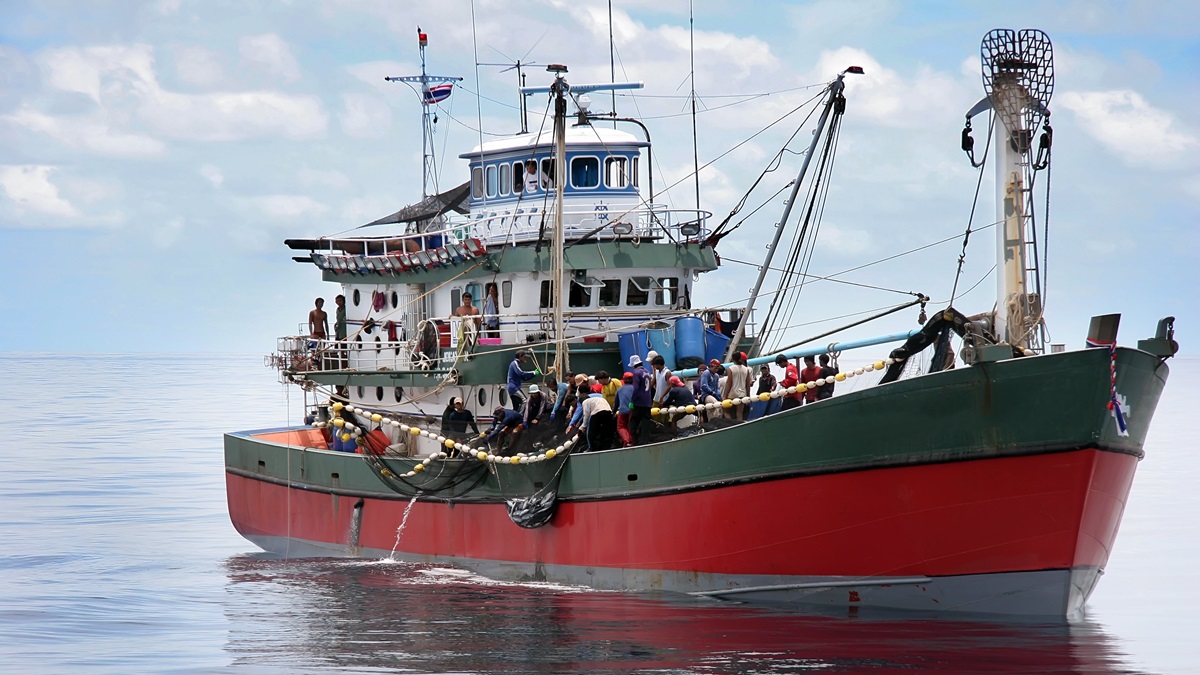The fishing industry, reliant on fossil fuels and vulnerable to climate change, needs to shift to alternative energy – but in a way that’s fair for vulnerable countries and communities.
© Shutterstock/Neophuket
Global fishing fleets, powered mainly by fossil fuels such as marine diesel, emit between 0.1% to 0.5% of global carbon emissions, or up to 159 million tons annually, according to the latest available data.
The fisheries sector, crucial for the livelihoods of more than 40 million people worldwide, faces escalating threats from climate change. These include rising sea levels and warming waters that jeopardize fishing ports and deplete fish stocks. The risks are particularly high for developing countries, where small-scale and artisanal fishing prevails.
Yet the fishing industry lacks comprehensive global targets and guidelines for transitioning to cleaner energy, a new UNCTAD report highlights.
The report covers a range of motorized fishing operations, from pre-harvesting to landing, and the infrastructure involved. It assesses the opportunities and challenges of adopting alternative fuels, emphasizing the need to ensure a “just” energy transition that doesn’t disproportionately affect vulnerable countries or fishing communities.
“The energy transition of fishing fleets presents a critical and urgent global issue as nations, and particularly developing countries, commit to net-zero targets and climate action,” says David Vivas Eugui, chief of UNCTAD’s ocean and circular economy section.
Need for targeted and stronger regulations
Regina Asariotis, chief of UNCTAD’s transport policy and legislation section, highlights the urgent need for more targeted and robust regulations for fishing fleets.
“Existing energy efficiency measures and regulations adopted by the International Maritime Organization for global shipping are of only limited application to fishing vessels, primarily due to their size and operational patterns,” Ms. Asariotis says.
For example, vessels that fall below certain tonnage thresholds or operate exclusively within a flag State’s jurisdiction are exempt. Fishing vessels are also currently excluded from reporting obligations and market-based measures for GHG reduction adopted at the European Union level, except for the taxation of energy products used to propel all vessels.
The UNCTAD report also finds that in the context of Nationally Determined Contributions (NDCs) under the Paris Agreement – where countries outline their pledges to cut emissions and adapt to climate change – most of the top ten major aquatic food exporters show limited commitments to climate mitigation or adaptation in fisheries-related sectors.
Alternative fuels: Opportunities and challenges
The report assesses several alternative fuels for fishing vessels at different maturity stages, underscoring the need for further research and development (R&D) for their successful integration.
Among the options, green biofuels, made from non-food feedstocks or fish waste, stand out as the most readily available and mature option.
The report acknowledges the promise of green hydrogen and green ammonia but says both require further R&D to address issues related to safety, scalability, cost-effectiveness, the storage capacity of vessels and ports, and delivery infrastructure.
For green methanol and liquefied natural gas, it says both pose challenges in terms of retrofitting and safety, with limited potential to fully decarbonize fleets.
UNCTAD also outlines other ways to reduce fishing vessels’ GHG emissions, such as electric and hybrid engines, wind propulsion technologies and digital technologies to improve energy efficiency.
A just transition requires a balanced and incremental approach
The report underscores the need for a balanced and gradual approach, calling for the incremental adoption of a sustainable energy mix to mitigate impacts on small-scale fisheries and marginalized fishing communities.
On the economic and technological fronts, UNCTAD calls for a globally harmonized system for data collection, adapted to small-scale and artisanal fisheries, to monitor and report fishing fleet GHG emissions.
It also encourages exploring sustainable fuel options from circular economy practices, such as converting fish waste and seaweed into biofuel or biogas for fishing vessels and expanding their delivery infrastructure.
From a trade, value chain and infrastructure point of view, the report urges the incremental phase-out and, ultimately, prohibition of fossil fuel-based subsidies to the fisheries sector.
Also crucial are effective measures on climate change adaptation, resilience-building and disaster risk reduction for seaport infrastructure, as well as improving access to affordable financing for developing countries.
On environmental considerations, the report calls on countries to introduce fishing fleet decarbonization commitments into NDCs to align mitigation and adaptation efforts, saying decarbonization cannot be decoupled from fish stocks sustainability.
Finally, addressing social factors, it calls for prioritizing the well-being, livelihoods and rights of fishers in the energy transition and enhancing safety standards.

